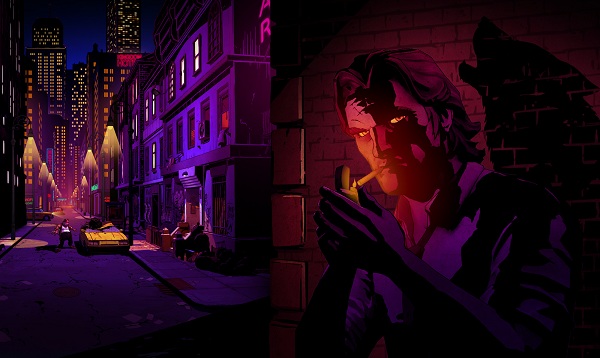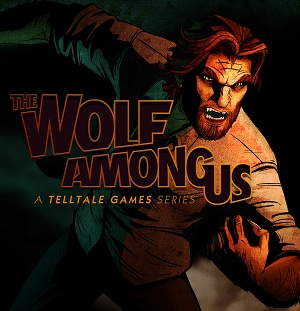 BUY IT FROM XBLA: RIGHT HERE!
BUY IT FROM XBLA: RIGHT HERE!
BUY IT FROM STEAM: RIGHT HERE!
BUY IT FROM PSN: RIGHT HERE!
PLATFORM: PC, Mac (Coming Soon), Xbox 360, Playstation 3
PRICE: XBLA/PSN: $4.99 (Episode), $14.99 (Season); PC $24.99 (Season)
ESRB RATING: M
DEVELOPER/PUBLISHER: Telltale Games
The Walking Dead was a hugely important achievement for Telltale Games, and not just for its huge financial success and critical acclaim. It was a comeback, a statement of faith in where they saw adventure games going after Jurassic Park – their first attempt at abandoning the traditional point-and-click adventures on which they’d built their original reputation in favour of a more cinematic, QTE-heavy style more in common with Heavy Rain than Monkey Island – failed to the extent that it sparked a sizeable and rather excessive backlash against the developer. Rather than reverting to the familiar style for The Walking Dead, however, they stuck to the new format and this time got it right. Great reviews (Including several Game of the Year awards), big sales and a sizable slice of the zeitgeist later, Telltale not only proved the doubters wrong but had come up with something of a phenomenon.
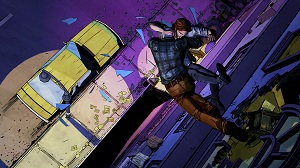 The problem with a phenomenon, however, is following it up. While Walking Dead Season Two was always a given, many were surprised when the immediate followup to TWD would be a series based on Bill Willingham’s Vertigo comic series Fables. While well-regarded in comics circles, the series – about fairytale characters living in exile in a secret community in New York – seemed an odd pick considering Telltale’s proclivity for more mainstream geek properties. With a relatively unknown title and a major shark-jump already in their history, the question was whether Telltale could continue the momentum established by their previous series.
The problem with a phenomenon, however, is following it up. While Walking Dead Season Two was always a given, many were surprised when the immediate followup to TWD would be a series based on Bill Willingham’s Vertigo comic series Fables. While well-regarded in comics circles, the series – about fairytale characters living in exile in a secret community in New York – seemed an odd pick considering Telltale’s proclivity for more mainstream geek properties. With a relatively unknown title and a major shark-jump already in their history, the question was whether Telltale could continue the momentum established by their previous series.
Short answer: If the first episode Faith is any indication, there shouldn’t be any worries about that. As a matter of fact, if the series keeps up in the spirit it’s kicked off it may be on track to not only match TWD, but surpass it.
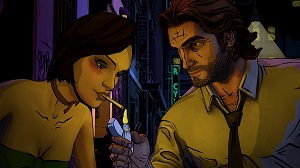 Things get off to a raucous start, with our protagonist Bigby Wolf (Think about it) launching himself into a bone-crunching brawl with his old rival, the now throughly burnt-out and embittered Woodsman. This punchup isn’t about Little Red Riding Hood this time, but a hooker the drunken Woodsman has assaulted. Bigby is sheriff of Fabletown, desperately trying to put his savage past behind him, and like any good noir hero the job is about as bad for him as he is for it. But when he makes a grisly discovery, he and Snow White (Now a bureaucrat trying to make a difference to the corrupt mess that has become Fabletown’s ruling class) are plunged into a web of conspiracy and murder which gets ugly fast.
Things get off to a raucous start, with our protagonist Bigby Wolf (Think about it) launching himself into a bone-crunching brawl with his old rival, the now throughly burnt-out and embittered Woodsman. This punchup isn’t about Little Red Riding Hood this time, but a hooker the drunken Woodsman has assaulted. Bigby is sheriff of Fabletown, desperately trying to put his savage past behind him, and like any good noir hero the job is about as bad for him as he is for it. But when he makes a grisly discovery, he and Snow White (Now a bureaucrat trying to make a difference to the corrupt mess that has become Fabletown’s ruling class) are plunged into a web of conspiracy and murder which gets ugly fast.
What’s immediately interesting about Willingham’s world is its thematic flexibility. On a basic level, you have a noir-flavoured postmodern take on fairytales, and on that level alone it’s hugely satisfying. Bigby is the perfect noir hero: One-eyed, socially abrasive and has the social circle (or lack thereof) to show for it, yet shot through with a noble streak he believes in least of everyone.
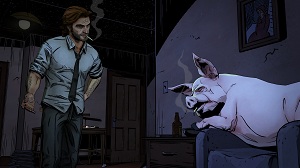 But the story also explores another great preoccupation of American storytelling: Immigrants’ tales and the search for new meaning following exile. Fabletown may be a refuge and a new home but it’s far from a happy one, with the Fables struggling to live like the normal humans (Or ‘Mundies’) they try to emulate but cannot assimilate with. Non-human creatures, like the put-upon Toad – who is now, appropriately, a cab driver – are reliant on a spell called Glamour to change their appearance so they can venture out into the Mundie world and support themselves and their families and avoid being sent to The Farm, an ominous-sounding institution built to shelter/intern non-humans who cannot pay for the increasingly expensive and exclusive spell.
But the story also explores another great preoccupation of American storytelling: Immigrants’ tales and the search for new meaning following exile. Fabletown may be a refuge and a new home but it’s far from a happy one, with the Fables struggling to live like the normal humans (Or ‘Mundies’) they try to emulate but cannot assimilate with. Non-human creatures, like the put-upon Toad – who is now, appropriately, a cab driver – are reliant on a spell called Glamour to change their appearance so they can venture out into the Mundie world and support themselves and their families and avoid being sent to The Farm, an ominous-sounding institution built to shelter/intern non-humans who cannot pay for the increasingly expensive and exclusive spell.
But even for the Fables who look human, this new life is fraught with the problems of establishing a new identity, and past lives that may be harder than anticipated to shake off. This is exemplified by Bigby, who seeks redemption for the acts committed by his big, bad former self, but is haunted by others’ memories of who he was…or perhaps still is. In a community where opportunity is increasingly shown up to be the luxury of the privileged, many Fables are beginning to revert back to their old ways, which means trouble for everyone.
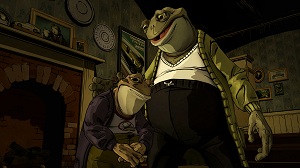 It’s a potent mix, and Lead Writer Pierre Shorette does a great job of weaving some pretty heavy themes into what could’ve easily been ‘Shrek Noir’. While TWD revolved around the idea of trust and the illusion of civilized behaviour in the ruins of civilization, The Wolf Among Us‘s drama strikes a deeper, more personal chord. Although the Fables are in the same place there’s a spiritual diaspora, a sense that all of these characters are lost and struggling to adopt the mundanities of a world for which they were never created. While the Woodsman, drunkenly mourning his faded celebrity, is the most blatant example of this all of the characters are similarly broken, and by the end of this first episode you start to feel like the gruesome turn events have taken is not an anomaly, but an inevitability. The game takes place some time before the comic series, so prior knowledge is not required to understand what’s going on. However, given the ominous pall that hangs over this world the safest option may be save the books until this story has concluded so as to avoid any unwelcome giveaways.
It’s a potent mix, and Lead Writer Pierre Shorette does a great job of weaving some pretty heavy themes into what could’ve easily been ‘Shrek Noir’. While TWD revolved around the idea of trust and the illusion of civilized behaviour in the ruins of civilization, The Wolf Among Us‘s drama strikes a deeper, more personal chord. Although the Fables are in the same place there’s a spiritual diaspora, a sense that all of these characters are lost and struggling to adopt the mundanities of a world for which they were never created. While the Woodsman, drunkenly mourning his faded celebrity, is the most blatant example of this all of the characters are similarly broken, and by the end of this first episode you start to feel like the gruesome turn events have taken is not an anomaly, but an inevitability. The game takes place some time before the comic series, so prior knowledge is not required to understand what’s going on. However, given the ominous pall that hangs over this world the safest option may be save the books until this story has concluded so as to avoid any unwelcome giveaways.
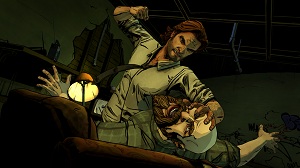 Visually, The Wolf Among Us utilizes the same comic-book style as The Walking Dead but is a much prettier affair, with noirish shadows and camera angles combining with splashes of primary colours to create a striking pulp aesthetic that’s much more impressive than TWD‘s green-and-brown colour palette. That said, the engine still reveals itself as creaky on occasion, with frame rate dips and bugs less prevalent than before but still in evidence.
Visually, The Wolf Among Us utilizes the same comic-book style as The Walking Dead but is a much prettier affair, with noirish shadows and camera angles combining with splashes of primary colours to create a striking pulp aesthetic that’s much more impressive than TWD‘s green-and-brown colour palette. That said, the engine still reveals itself as creaky on occasion, with frame rate dips and bugs less prevalent than before but still in evidence.
In terms of gameplay, though, it’s much the same as before: choice-driven narrative prioritizing conversation and interaction with the environment over action. Action scenes are present, and use the same QTE-based interface and seem a little more elaborate than TWD, but feel slightly more forgiving in execution: this is a smart choice, as while some might accuse Telltale of making the QTEs too easy this time it promotes immersion in the scene rather than lightning-fast reflexes. QTEs have been long reviled for their intrusive nature and distancing effect when they get too fiddly, but Telltale have wisely contextualized them by using them in a different kind of game where these flashes of action are more about mental alertness under pressure. It’s an illusory form of control to be sure, but it’s a masterfully-sold illusion.
When it comes to recommending The Wolf Among Us, the dividing line is extremely simple. If you enjoyed TWD no recommendation for this game is strong enough, but they have developed a very particular gameplay system for these games which you’re either into or you’re not. This is Telltale having found their niche and preaching to the converted, and those not already onboard may not find much to change their minds. For those who are, this series has gotten off to an excellent start with a first episode that is if anything stronger than TWD‘s opening. The question now is whether they can sustain it.
Rating: 




Out of a Possible 5 Stars
